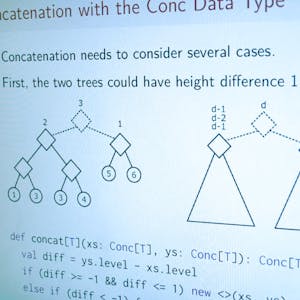Parallel programming
About this Course
With every smartphone and computer now boasting multiple processors, the use of functional ideas to facilitate parallel programming is becoming increasingly widespread. In this course, you\'ll learn the fundamentals of parallel programming, from task parallelism to data parallelism. In particular, you\'ll see how many familiar ideas from functional programming map perfectly to to the data parallel paradigm. We\'ll start the nuts and bolts how to effectively parallelize familiar collections operations, and we\'ll build up to parallel collections, a production-ready data parallel collections library available in the Scala standard library. Throughout, we\'ll apply these concepts through several hands-on examples that analyze real-world data, such as popular algorithms like k-means clustering. Learning Outcomes. By the end of this course you will be able to: - reason about task and data parallel programs, - express common algorithms in a functional style and solve them in parallel, - competently microbenchmark parallel code, - write programs that effectively use parallel collections to achieve performance Recommended background: You should have at least one year programming experience. Proficiency with Java or C# is ideal, but experience with other languages such as C/C++, Python, Javascript or Ruby is also sufficient. You should have some familiarity using the command line. This course is intended to be taken after Functional Program Design in Scala:Created by: École Polytechnique Fédérale de Lausanne

Related Online Courses
At the end of this project, you will have all the basic skills to create a professional Newsletter using SendinBlue, an online tool for creating professional Email Campaigns. You will be able to... more
Part 3 of the Privacy Fundamentals explores information security and data protection and how to manage a security breach. We will also take a look at continual improvement which includes... more
How much can we know of the physical world? Can we know everything? Or are there fundamental limits to how much we can explain? If there are limits, to what extent can we explain the nature of... more
Dive into the world of Microservices Architectures with this comprehensive course, designed to provide a clear understanding of both the theoretical and practical aspects of building scalable and... more
The Advanced Network Security specialization is designed for Network Security Analysts, Information Technology (IT) Managers, or Cybersecurity Consultants to further their understanding of advanced... more








